
A 16-year-old girl in The Gambia has tragically died after undergoing female genital mutilation (FGM), a practice widely condemned by global health organisations. The incident has sparked renewed outrage and calls for stricter enforcement of bans on the procedure.
The teenager reportedly suffered severe complications following the ritual, which led to her untimely death. Activists and human rights groups are urging the Gambian government to take immediate action to prevent further tragedies.
What is FGM?
Female genital mutilation involves the partial or total removal of external female genitalia for non-medical reasons. It is recognised internationally as a violation of human rights and is linked to severe physical and psychological consequences.
Global Efforts to End FGM
Despite being illegal in many countries, FGM remains prevalent in certain communities due to deep-rooted cultural beliefs. The World Health Organization (WHO) and other agencies have long campaigned for its eradication, emphasising the dangers it poses to young girls and women.
This latest case in The Gambia highlights the urgent need for education and legal measures to protect vulnerable individuals from this harmful tradition.





